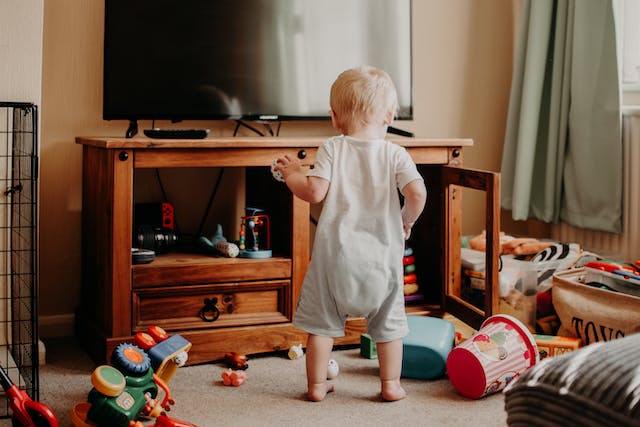Are You Stuffed with Too Much Stuff?

By Karen Deerwester, Ed.S.
‘Tis the season for stuff! You buy stuff, build stuff, wrap stuff, ship stuff, return stuff, and buy more stuff. And then we say we love this time of year because it reminds us of what really matters in our lives – and it’s not the stuff. What’s a parent suppose to do?
Only you can decide how much is too much stuff. In general, if your children appreciate what is theirs, value what is theirs, age-appropriately care for what is theirs, and show respect for what belongs to others, you do not have a problem with stuff. If you are uncertain about any of the above, you may need to teach your children how to live in a world of stuff. As you probably already know, you can’t teach children much by lecturing them and so you will need a few principles to live by.
Can you really tell others what and how much to buy for your children? Well, you can try. But I know myself and I love to discover new things to share with children and new ways to drive my friends with children completely mad (I buy the drums, the wicked art supplies, and the replay-in-your-sleep CD’s.) But you probably have a few relatives who want to be well-remembered by your children and would welcome “perfect gift” suggestions from you.
Principle #1: Sit in a quiet place for a few minutes and write down what your children would truly like this year (books, a swim with the dolphins, or those big ticket items that will last for years.)
Before any new stuff arrives in your house, you need a plan of how to organize the existing stuff. Are you already rotating toys to keep play uncluttered? Too much stuff ruins the value of play by giving children too many options and fostering a reckless attitude. Are you boxing up the stuff that isn’t being used? Remember that closet-organizing principle; if you haven’t worn it in year, get rid of it. So too for kid-stuff – if they aren’t playing with it any more, either change its location or pack it up for other children to enjoy.
Principle #2: Create a holiday ritual around your child giving as well as receiving. Put away younger toys for a younger sibling. Donate gently used toys to a charity. Actively teach your child to care for and about others by making time for community service. Even toddlers can visit senior living centers.
In my opinion it’s the adults, not the children, who have a problem with stuff. Children have always had the good sense to choose the cardboard boxes over the expensive toys. But we as gift-givers want to be special and the media now knows how to play on those anxieties. Sadly, the media is also deliberately marketing to young impressionable minds. Parents now have the additional responsibility of monitoring and counteracting media sales tactics.
Principle #3: Be prepared to say “no” and to teach your children standards of value. Just as you would never allow encourage candy for breakfast, lunch and supper, explain in simple terms that certain products are just not good for them. Define for your children what is “enough”, knowing that they will not agree with you until many years later.
Children are developmentally “me-mine-now”. They believe they are the center of the universe. Their needs are urgent and their wishes await fulfillment. They must learn to delay gratification and they must be taught to handle disappointment with grace. Only you can change the “gimme’s”
Principle #4: Rehearse with children how to express appreciation for all gifts, to open gifts with awareness of the giver, and to follow-up with a tangible “thank you” (a note or a call).
Lastly, the whole point of stuff for children is meaningful engagement. I don’t mean the educational quality of the experience. I mean an old fashioned sense of play, in the best sense of the word. The stuff is doing its job if it is keeping your children busy (not bothering you) for extended periods of time. Of course, this does not apply to media or electronics – particularly the kind of addictive engagement that leads to children who are bored or floundering without stuff.
The child with the most toys doesn’t really win. The child who is fun and funny wins. The child who is interested and interesting wins. The child who enjoys stuff but doesn’t need stuff wins.
Principle #5: Everyone should have enough stuff to enjoy the bounty of this world.
May the richness of giving and receiving be in your heart this holiday season.
� Family Time Inc.
Karen Deerwester is the owner of Family Time Coaching & Consulting, writing and lecturing on parenting and early childhood topics since 1984. Karen is also the Mommy & Me director at The Ruth and Edward Taubman Early Childhood Center at B�nai Torah Congregation in Boca Raton.
The content available through the Site is the sole property of Family Time Inc., or its licensors and is protected by copyright, trademark and other intellectual property laws. Except as otherwise explicitly agreed in writing, Family Time Inc.-owned content received through the Site may be downloaded, displayed, reformatted and printed for your personal, non-commercial use only.





Follow Us
Join the conversion. Make sure to follow us on our social platforms for the latest content and FamilyTime news.